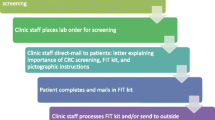Abstract
Purpose
HPV self-sampling has previously been shown to increase cervical cancer screening among ethnic minority and immigrant women. We conducted a randomized pragmatic trial to examine the effectiveness of HPV self-sampling delivered via in-person versus by US mail for medically underserved Hispanic, Haitian, and non-Hispanic Black women living in South Florida.
Methods
We randomized women aged 30–65 who had not completed Pap smear screening in the past 3 years into two groups: (1) HPV self-sampling delivered in-person (IP) by a community health worker (CHW; IP + SS) or (2) HPV self-sampling delivered via US mail (SS + Mail). Our primary outcome was HPV self-sampling completion by 6-month post-study enrollment.
Results
We enrolled 600 women. Approximately 65% were Hispanic and 35% were Haitian or non-Hispanic Black. Nearly half (43%) had an income of less than $20,000/year and 67% were uninsured. In intent-to-treat analyses, 71.6% of participants in the SS + Mail group and 81.0% of participants in the IP + SS group completed HPV self-sampling.
Conclusion
Mailed HPV self-sampling is an effective strategy to increase cervical cancer screening among underserved immigrant and ethnic minority women.


Similar content being viewed by others
References
U.S. Cancer Statistics Working Group (2016) United States Cancer Statistics: 1999–2013 incidence and mortality web-based report. Atlanta: U.S. Department of Health and Human Services, Centers for Disease Control and Prevention and National Cancer Institute. http://www.cdc.gov/uscs. Accessed 12 Jan 2017
Beavis AL, Gravitt PE, Rositch AF (2017) Hysterectomy-corrected cervical cancer mortality rates reveal a larger racial disparity in the United States. Cancer 123:1044–1050
Musselwhite W, Oliveira CM, Kwaramba T et al (2016) Racial/ethnic disparities in cervical cancer screening and outcomes. Acta Cytol 60:518–526
Lin L, Benard VB, Greek A, Hawkins NA, Roland KB, Saraiya M (2015) Racial and ethnic differences in human papillomavirus positivity and risk factors among low-income women in Federally Qualified Health Centers in the United States. Prev Med 81:258–261
Downs LS, Smith JS, Scarinci I, Flowers L, Parham G (2008) The disparity of cervical cancer in diverse populations. Gynecol Oncol 109:S22–S30
Seay JS, Carrasquillo O, Campos NG, McCann S, Amofah A, Pierre L et al (2015) Cancer screening utilization among immigrant women in Miami, Florida. Prog Commun Health Partnersh Res Educ Action 9(Suppl 2):11–20
Florida Cancer Data System (2014) http://fcds.med.miami.edu/inc/welcome.shtml. Accessed 26 June 2017
Centers for Disease Control and Prevention. National Program of Cancer Registries (NPCR). http://www.cdc.gov/cancer/npcr/tools.htm. Accessed 26 June 2017
Menard J, Kobetz E, Maldonado JC, Barton B, Blanco J, Diem J (2010) Barriers to cervical cancer screening among Haitian immigrant women in Little Haiti, Miami. J Cancer Educ 25(4):602–608
Racey CS, Withrow DR, Gesink D (2013) Self-collected HPV testing improves participation in cervical cancer screening: a systematic review and meta-analysis. Can J Public Health 104:e159–e166
Verdoodt F, Jentschke M, Hillemanns P, Racey CS, Snijders PJ, Arbyn M (2015) Reaching women who do not participate in the regular cervical cancer screening program by offering self-sampling kits: a systematic review and meta-analysis of randomized trials. Eur J Cancer 51:2375–2385
Arbyn M, Verdoodt F, Snijders PJ, Verhoef VM, Suonio E, Dillner L et al (2014) Accuracy of human papillomavirus testing on self-collected versus clinician-collected samples: a meta-analysis. Lancet Oncol 15(2):172–183
Belinson JL, Du H, Yang B, Wu R, Belinson SE, Qu X et al (2012) Improved sensitivity of vaginal self-collection and high-risk human papillomavirus testing. Int J Cancer 130(8):1855–1860
Huh WK, Ault KA, Chelmow D et al (2015) Use of primary high-risk human papillomavirus testing for cervical cancer screening: interim clinical guidance. Gynecol Oncol. https://doi.org/10.1016/j.ygyno.2014.12.022
Carrasquillo O, McCann S, Amofah A et al (2014) Rationale and design of the research project of the South Florida Center for the reduction of cancer health disparities (SUCCESS): study protocol for a randomized controlled trial. Trials 15:299
Carrasquillo O, Seay J, Amofah A et al (2018) HPV self-sampling for cervical cancer screening among ethnic minority women in South Florida: a randomized trial. J General Internal Med. https://doi.org/10.1007/s11606-018-4404-z
Kobetz E, Seay J, Amofah A et al (2017) Mailed HPV self-sampling for cervical cancer screening among underserved minority women: study protocol for a randomized controlled trial. Trials 18(1):19
Tiro JA, Meissner HI, Kobrin S, Chollette V (2007) What do women in the U.S. know about human papillomavirus (HPV) and cervical cancer? Cancer Epidemiol Biomark Prevent 16(2):288–294
Obama B (January 12th 2017) Statement by the President on Cuban Immigration Policy. The White House. Retrieved 26 June 2017. https://obamawhitehouse.archives.gov/the-press-office/2017/01/12/statement-president-cuban-immigration-policy
Acknowledgments
We wish to thank our study team who played a critical role in ensuring completion of the study. These include our Community Health Workers, Valentine Cesar (Center for Haitian Studies), Maria Azqueta (Citrus Health Inc.), and Linabell Lopez (Community Health Inc.), our Health Choice Network (HCN) Project Manager, Ludmilla Paul, as well as, our data managers Carmen Linarte and Feng Miao.
Funding
This work was supported by the National Cancer Institute (1R01CA183612).
Author information
Authors and Affiliations
Corresponding author
Ethics declarations
Conflict of interest
The authors have no potential conflict of interest to disclose.
Ethical approval
All procedures performed in our study were in accordance with the ethical standards of our institutional review board and with the 1964 Helsinki declaration and its later amendments.
Informed consent
Informed consent was obtained from all individual participants included in the study.
Rights and permissions
About this article
Cite this article
Kobetz, E., Seay, J., Koru-Sengul, T. et al. A randomized trial of mailed HPV self-sampling for cervical cancer screening among ethnic minority women in South Florida. Cancer Causes Control 29, 793–801 (2018). https://doi.org/10.1007/s10552-018-1055-7
Received:
Accepted:
Published:
Issue Date:
DOI: https://doi.org/10.1007/s10552-018-1055-7



